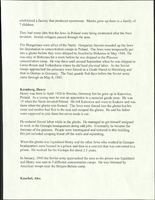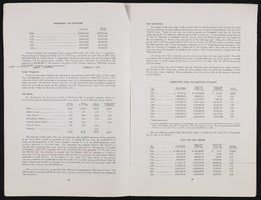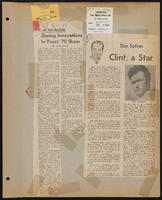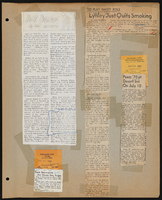Search the Special Collections and Archives Portal
Search Results
Summa Corporation Summerlin Development Presentation Materials
Identifier
Abstract
The Summa Corporation Summerlin Development Presentation Materials (approximately 1990-1999) consist of presentation slides and architectural and landscape renderings for developing the Las Vegas, Nevada community of Summerlin.
Archival Collection

Mabel Hoggard School: ephemera
Date
Archival Collection
Description
Folder of materials from the Mabel Hoggard Papers (MS-00565) -- Educational work and legacy file. This folder contains the Mabel Hoggard 6th Grade Center 1984-1985 yearbook, correspondence to Mabel Hoggard, Mabel Hoggard School event programs, newspaper clippings, and other documents related to Mabel Hoggard School.
Mixed Content

Transcript of interview with Michael Tell by Barbara Tabach, January 6, 2018
Date
Archival Collection
Description
Michael Tell, the youngest son of Jack and Beatrice Tell, is the publisher of the Las Vegas Israelite newspaper and the second generation of ownership. He briefly traces his Jewish ancestral roots back to Eastern European grandparents who settled in New Jersey and New York. He became a bar mitzvah in a conservative Jewish synagogue in New York City. At age sixteen, he accompanied his father, Jack Tell, westward to Nevada. The elder Tell was in pursuit of owning a newspaper and Mike was a perfect companion as Jack took over ownership of the Territorial Enterprise. Mike recalls it was a short lived venture and the family settled in Las Vegas, where his father went to work for Hank Greenspun at the Las Vegas Sun and then for Henderson Home News, owned by Morry Zenoff. In 1965, Jack Tell opened the Las Vegas Israelite. Meanwhile, Mike explored the lucrative business of concert promotions and opened a teen nightclub 1961 called the Twin Lakes Twist. He hired such talents of the era as Bobby Darin and Wayne Newton. Soon his business acumen grew and he moved Mike Tell Productions to Los Angeles. He tells the story of his last concert, booking Al Green, and being held at gunpoint. Then in 1979, he returned to work at the Israelite, which had a circulation of about 2000. The Jewish community was beginning to show signs of growth. He recalls running an ad in 1992 for High Holy Days services to be held at the Aladdin hotel. He used the word “Lubavitvh” in the ad and this sparked an interest in Las Vegas from the Chabad movement. He also recalls anti-Semitic episodes in Las Vegas, such as Ralph Englestad’s Hitler birthday parties and the presence of Skinheads. And he reflects on the changes in the community that he has observed over the decades.
Text
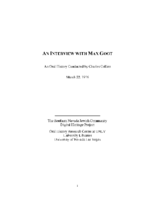
Transcript of interview with Max Goot by Charles Collins, March 22, 1976
Date
Archival Collection
Description
Interview with Max Goot by Charles Collins, March 22, 1976. In this interview, Goot talks about how he came to Las Vegas in 1945 and purchased Stoney's Jewelry, which he sold in 1951, and then bought Tinch Furniture Store. He was friends with Hank Greenspun and active in local politics and community affairs, including Temple Beth Sholom. He talks about selling the former Beth Sholom building at 13th and Carson Streets to the Greek church, and other fund raising activities. He speaks briefly about atomic tests, and the growth of the city.
Text

Lauren M. Brown oral history interview: transcript
Date
Archival Collection
Description
Oral history interview with Lauren M. Brown conducted by Claytee D. White on February 21, 2018 for the Remembering 1 October Oral History Project. In this interview, Lauren M. Brown discusses her history with Las Vegas, Nevada, starting from when she moved to the city in 1997. She describes her experience as one of the many who stood in line to donate blood on October 2, 2017, the day after the 2017 Las Vegas mass shooting. Brown talks about what stood out on that day, including the overwhelming amount of people waiting to donate blood and the people who brought drinks and pastries for those waiting. She speaks about how that day showed her the heart of Las Vegas and changed her perspective of the city. Brown also discusses her correspondence with the Healing Garden to give ideas for the design of a permanent memorial for the tragedy.
Text

Mabel Hoggard: greeting cards (folder 1 of 3)
Date
Archival Collection
Description
Folder of materials from the Mabel Hoggard Papers (MS-00565) -- Personal papers file. This folder contains greeting cards, postcards, and letters.
Mixed Content

